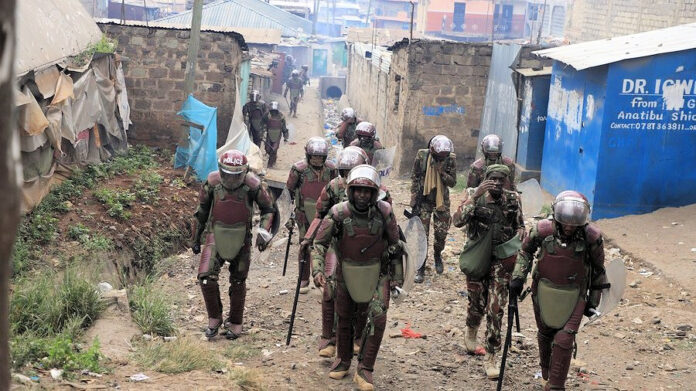“We will fight in the streets of Nairobi for our brothers and sisters in Haiti” if Kenya’s government proceeds to deploy its police to the Caribbean nation, Booker Ngesa Omole, National Organizing Secretary of the Communist Party of Kenya (CPK), told Peoples Dispatch.
Despite the prohibition by Kenya’s High Court, Kenyan policemen “can be deployed to Haiti as soon as next week” President William Ruto said on Tuesday, Jan. 30, speaking from Rome, where he was wooing European investors at the Italy-Africa summit.
“Any decision by any state organ or state officer to deploy police officers to Haiti … contravenes the constitution and the law, and is therefore unconstitutional, illegal and invalid,” Kenya’s High Court had ruled only days ago on Jan 26.
The ruling dealt a setback to the planned U.S.-sponsored intervention in Haiti, to which Kenya is to give an African face by deploying a thousand police personnel to lead the mission, whose purported objective is to restore security by ridding Haiti of the menace of criminal gangs.
Amid the chaos in the aftermath of the assassination of the then president Jovenel Moïse in July 2021, Haiti, already destabilized by three foreign interventions in the last thirty years, descended into an anarchy in which gang violence has become rampant. Gangs have reportedly killed and kidnapped thousands, sending hundreds of thousands fleeing last year, setting a new record of violent crimes.
Jamaica has also had a comparable rate of gang violence. Its homicide rate has “for several years been among the highest in the Western Hemisphere,” the U.S. said in a travel advisory on Jan. 23. “Violent crimes, such as home invasions, armed robberies, sexual assaults, and homicides, are common,” it explained. Nevertheless, Jamaica, far from being slated for foreign intervention, will be contributing police to the U.S.-funded mission to ostensibly restore security in Haiti.
Another 150 personnel-strong deployment has been promised by the Bahamas, where the U.S. embassy has issued a security alert, warning about “gang violence” and “murders” occurring “at all hours including in broad daylight on the streets.” The small islands of Antigua and Barbuda, whose government has promised to contribute a police force to this mission, are also in the throes of gang violence.
This smaller Caribbean deployment is to supplement the lead deployment of over a thousand Kenyan policemen, whom Booker described as an “extremely unprofessional force, frequently used by political leaders to carry out criminal activities, including political assassinations.”
“The biggest killer of young people in Kenya is not malaria but the police”
He alleged that the “biggest killer of young people in Kenya today is not malaria or any other disease, but the police. Every day, we continue to register the murder of several young poor people by the Kenyan police in the informal settlements of Nairobi. This is the kind of police the US has chosen to lead its intervention in Haiti.”
With abstentions from Russia and China, the UN Security Council authorized this mission with a vote on Oct. 2, 2023. However, it is not an official UN peacekeeping mission. It was christened as a “Multinational Security Support (MSS) mission,” which is a “novel mechanism,” as acknowledged by the U.S., which is largely funding the mission and has pledged US$200 million already.
“If the Kenyan police was serious about eliminating criminal gangs, they would have done so here in Kenya first”
“If the Kenyan police was serious about eliminating criminal gangs, they would have done so here in Kenya first,” Booker said, arguing that the police have instead been collaborating with gangs that are in a nexus with political leaders. “There is only a thin line between the Kenyan police and the criminal gangs that continue to terrorize residents of, say, the northeastern province or the poor neighborhoods in Nairobi.”
This line is even thinner in Haiti, where many current gangsters have been former members of the Haitian National Police, which this US mission led by Kenya is to assist in restoring law and order. Such a coalition “will only end up committing more crimes in Haiti,” adding to the violence its people are already suffering, Booker argued.
U.S. Defense Secretary Lloyd Austin claimed last September that “This [mission] will be in total respect to the human rights of all the civilians in Haiti.”
Haitians, however, are not convinced that “this” particular foreign intervention will respect human rights, unlike the previous three in the past three decades, or “41 in the last 108 years” as FP reported. Perceiving these interventions by the U.S. and its proxies as the root of the current crisis, Haitians have organized several rounds of protests ever since its acting President Ariel Henry called for foreign intervention in October 2022.
Henry is neither an elected representative of the Haitians, nor was he chosen by the elected representatives. He was nominated to the second highest position in the government, that of the Prime Minister, by the then-President Jovenel Moïse in mid-2021, only two days before his assassination. Henry, who was a prime suspect in the murder, was directed to take power by the so-called Core Group.
Alongside the U.S., this group consists of representatives from France, Canada, Germany, Spain, Brazil, the UN, the Organization of American States (OAS) and the European Union (EU). Henry is in effect “a puppet appointed by the West,” Booker insists.
When the humanitarian crisis, worsening since he took power, provoked protests calling for his resignation, Henry called for a foreign intervention to ostensibly free Haiti from gangs, which are awash with arms and ammunition from the U.S..
The U.S. first leaned on Canada, and then on Brazil, to lead the intervention. Both refused. Over 12,000 km away from Haiti, the east African country of Kenya, which has been playing second-fiddle to U.S. interests ever since Ruto assumed its presidency in late 2022, rushed to volunteer, asking for US$237.55 million in return.
Ruto, who had “coined the term ‘economic diplomacy’, which means diplomacy without principles,” is selling Kenya’s foreign policy to the highest bidder, criticized Booker. With this approach, Ruto has reduced Kenya’s government to “an American puppet.” Soon after coming to power, Ruto had hastened to rescind Kenya’s recognition of Western Sahara and legitimize Morocco’s occupation of the country, only to revert after facing a backlash.
Cheered on by the U.S. and the IMF, Ruto introduced the Finance Act 2023 mid-last year, which aggravated the cost of living crisis, but was nevertheless praised by the U.S. ambassador to Kenya for giving Americans “safety on investing in the country.” The “reforms” provoked mass protests against Ruto’s government, which unleashed the police that killed dozens and arrested hundreds in July 2023. When the High Court struck out parts of the Finance Act as unconstitutional, “the ruling party even sponsored protests against the judiciary,” recalled Booker.
“A continuation of Ruto’s policy of appeasing his Western masters”
“Ruto has even defended the Genocide in Gaza by unequivocally saying that Israel has the right to self-defense, even though the Kenyan public see a massive genocide being supported by their own government,” Booker said. Ruto’s offering of the Kenyan police to do the bidding of the US and its allies in Haiti is a continuation of his policy of appeasing “his Western masters,” Booker argued.
But the National Security Council (NSC) led by President Ruto has no authority to deploy the police force outside the country, the High Court ruled on Jan. 26. Article 240 of Kenya’s constitution, which established the NSC, only allows the council to deploy the military outside Kenya — not the police.
The judge added that the police can only be deployed in accordance with the National Police Service Act, which requires “reciprocal arrangements” with the country hosting the foreign deployment. “[T]here is no reciprocal arrangement between Kenya and Haiti and for that reason, there can be no deployment of police to that country,” the judgment states.
Ruto has reassured reporters in Rome that the requirement for “reciprocal arrangements” will be quickly met and the police will be deployed in the coming days “if all the paperwork is done between Kenya and Haiti on the bilateral route that has been suggested by the court.”
Dashing out the “paperwork” may indeed be easy for the unelected, foreign-directed president of Haiti, who has no need to secure the confidence of parliamentarians, all of whose terms have lapsed as he has refused to hold parliamentary elections. Whether Kenya’s High Court will accept the “paperwork” with a government of such questionable legitimacy as sufficient proof of a ‘reciprocal arrangement’ with Haiti remains to be seen.
Regardless of the High Court’s position, “Kenya’s ruling class led by Ruto’s administration is determined to have their way, even if it would mean violating the judiciary and the constitution,” Booker maintains.
Only days after the UNSC approved this mission last October, Kenya’s High Court had already issued a “conservatory order” against the deployment to Haiti, while it considered the case brought against it by the Third Way Alliance, which Booker described as a “sister party.”
Despite the order, Kenya’s parliament gave its approval to the deployment only a month later in November. The Parliament enjoys little confidence of the people, Booker maintains, dismissing the legitimacy of the nod it gave to the deployment.
“Every time the President wants a law passed, he invites the MPs to the state-house and issues them with envelopes of money, and the majority of them fall in line. Even MPs of opposition parties, which have taken a position against this deployment, either abstained from voting or did not attend the session. The ruling party can get any rubbish passed by this parliament,” he said.
Only hours after the parliament’s approval, the High Court extended its blockade on the deployment until its ruling on January 26. Without waiting for the ruling, a “pre-planning conference” was convened in Nairobi, with representatives from the US, Kenya and Jamaica in attendance.
The pending court case was merely “acknowledged” in this conference, while Ruto was “lauded” for “securing Cabinet and parliamentary authorization for the deployment,” according to a joint statement published on the website of the US State Department. By early January, weeks before the ruling, the training of the police units slated for deployment was completed.
“We remind these policemen that they have to be prepared to pay with their lives if they allow themselves to be brokered out for imperialist use by corrupt political leaders,” Booker said. “If they think they will just walk in and shoot some gangsters, they are naive – they don’t know Haiti’s history of resistance to imperialism.”
This article was first published by Peoples Dispatch.












[…] notoriously corrupt and brutally repressive Kenyan police force, although Kenya’s High Court has ruled it cannot be deployed. Nonetheless, President William Ruto and Washington are trying to circumvent the […]
[…] the notoriously corrupt and brutally repressive Kenyan police force, although Kenya’s High Court has ruled it cannot be deployed. Nonetheless, President William Ruto and Washington are trying to circumvent the […]
[…] But the Multinational Security Support (MSS) mission has not been able to get off the ground, in part due to the resistance of the masses in those other neocolonies, particularly in Kenya. […]
[…] la colère du peuple kenyan pourrait s’évaser, tout comme il l’a fait pendant Énormes démonstrations à travers Nairobi en 2023. Il peut également approfondir le Déjà bas moral et une grande insatisfaction parmi les troupes […]